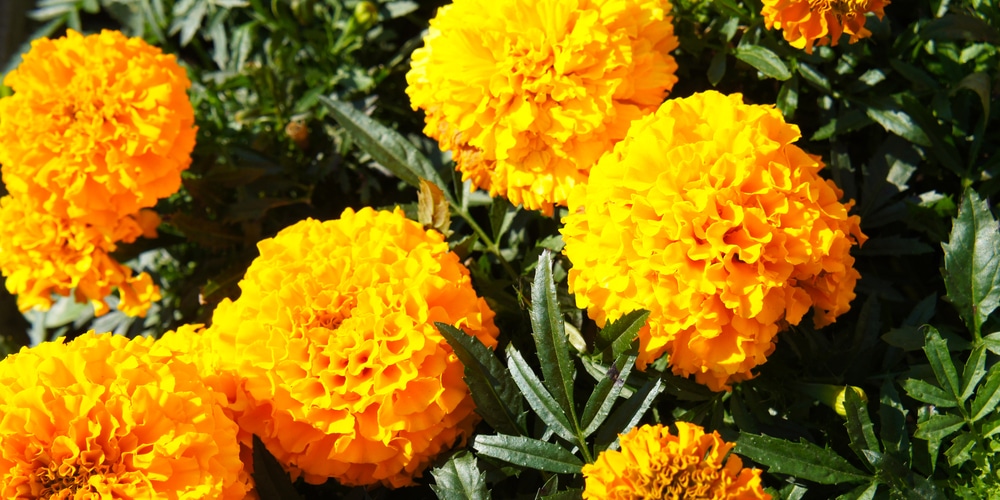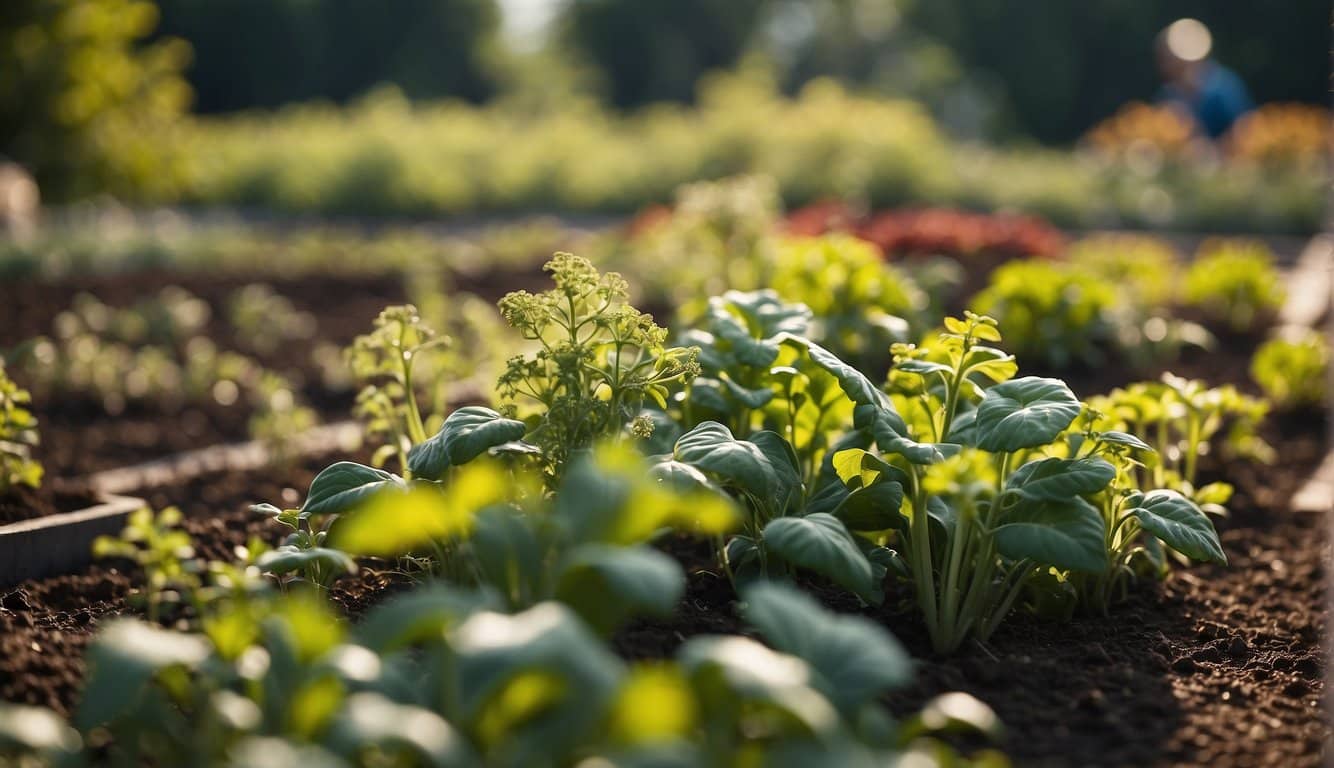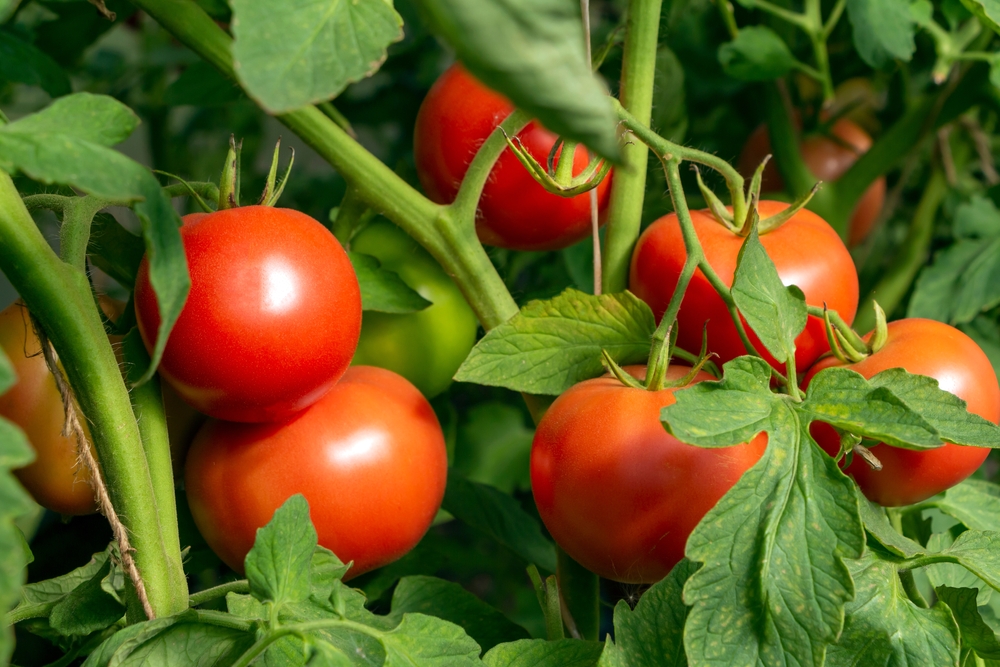Why Companion Planting?
In the vibrant world of Illinois vegetable gardens, companion planting is your strategic approach to cultivating a thriving ecosystem.
Let’s explore how it enhances your garden’s health and productivity.
Benefits of Companion Planting
Pest Control: Certain plant pairings can naturally repel garden pests.
For instance, marigolds release a substance that deters nematodes, while the pungent odors of herbs like basil can confuse or ward off harmful insects.
- Improved Pollination: Companion planting increases the diversity of your garden.
- Flowers like cosmos attract pollinators, boosting crop yields.
Disease Prevention: A diverse garden can hinder the spread of plant diseases.
Healthy plant combinations enable better airflow, which reduces the risk of fungal infections.
- Soil Health: Deep-rooted plants can help improve soil structure, while legumes like beans fix nitrogen in the soil, benefiting neighboring plants.
Maximized Use of Space: Plants with different growth habits can be paired to use garden space more efficiently.
For example, tall plants offer shade for those that need protection from the intense sun.
Principles of Effective Companion Planting
Know Your Plants’ Needs: Tailor your companion planting strategy by understanding the light, water, and nutrient requirements of each plant.
Ensure compatible needs among plant partners to avoid competition.
- Consider the Timing: Account for different growth rates and plant sizes.
- Plant fast growers that will be harvested before they can overshadow slower-growing companions.
Utilize Diversity: A mix of plant species can stymie pests and reduce disease risk.
Intersperse crops with flowers and herbs to create a balanced garden ecosystem.
- Plant Families Together: Vegetables from the same family often thrive when planted in proximity due to similar nutritional and watering needs.
- However, be mindful of rotating these groups to prevent soil depletion and disease build-up.
Essential Companions for Illinois Vegetables
In the diverse climate of Illinois, companion planting can be your secret weapon for a thriving garden.
Let’s explore the best friends your vegetable plants can have for optimal growth and pest control.
Companion Plants for Tomatoes
Basil is a star when it comes to enhancing the flavor of your tomatoes and repelling harmful insects.
Marigolds also play a crucial role; their presence can deter nematodes from attacking the tomato roots. Here’s a helpful list:
- Basil: Repels pests, improves flavor
- Marigold: Deters nematodes, attracts pollinators
Companion Plants for Peppers
Peppers benefit from companions that ward off common pests like aphids.
Petunias have a track record for keeping these pesky insects at bay while also adding a splash of color to your garden. Consider these companions for robust peppers:
- Petunias: Discourage aphids, add aesthetic value
- Chives: Improve flavor, deter pests
Companion Plants for Leafy Greens
Leafy greens like lettuce and spinach relish the shade provided by taller plants on hot days.
Pair them with celery to optimize space and reduce weeds. Aromatic herbs like dill can also attract beneficial insects to shield your greens from pests. A quick guide for you:
- Celery: Shades the soil, suppresses weeds
- Dill: Attracts wasps and other predators of pests
Avoiding Incompatible Plant Pairings
Negative Plant Interactions
In your Illinois vegetable garden, certain combinations can hinder growth. It’s crucial to avoid these pairings to ensure a flourishing garden.
Allelopathy occurs when one plant releases chemicals that inhibit another’s growth—a phenomenon that could sabotage your harvest. Here are specific plants to keep apart:
- Tomatoes should not be planted with corn due to the common pests they share.
- Potatoes and pumpkins compete for nutrients and can attract the harmful Colorado potato beetle.
- Onions and beans do not mix, as onions can inhibit the growth of beans.
To counteract these interactions, refer to the table below:
| Avoid Planting Together | Reason |
|---|---|
| Tomatoes with Corn | Shared pests can lead to infestations. |
| Potatoes with Pumpkins | They are competitors and attract pests. |
| Onions with Beans | Onions release substances harmful to beans. |
Common Mistakes in Illinois Gardens
As you plan your garden, bear in mind that some traditional plant combinations might not work well in the unique climate and soil conditions of Illinois. Examples include:
- Carrots should be kept away from dill, despite their popularity together, to prevent pest issues.
- Cucumbers might be affected by aromatic herbs that otherwise benefit other plants.
By being aware of these common mistakes, you can avoid unintentional harm to your crops:
- Maintain a safe distance between carrots and dill.
- Plant cucumbers separate from strong-scented herbs to prevent growth interference.
Frequently Asked Questions
Explore some of the most common inquiries about companion planting to enhance your Illinois vegetable garden.
What are ideal flower companions for vegetable gardens in Illinois?
In Illinois, marigolds and nasturtiums are exceptional flower companions for your vegetable patch.
Marigolds deter nematodes and other pests, while nasturtiums can attract beneficial predators and provide ground cover.
Which vegetables should be paired together in Illinois gardens for optimal growth?
Tomatoes and basil are a classic pairing, as the basil enhances the tomato’s flavor and repels pests.
Other effective pairings include cucumbers with radishes, which deter cucumber beetles, and peppers planted near carrots to help break up the soil.
What are some common companion planting mistakes to avoid for Illinois gardens?
Avoid planting vegetables that can stunt each other’s growth, such as onions near beans or peas.
Also, be conscious of shade tolerance; tall plants like corn can shade out sun-loving plants like peppers if not spaced properly.
What is an effective garden layout for companion planting in an Illinois vegetable garden?
A beneficial garden layout includes taller plants on the north side to prevent shading, interspersed with compatible shorter plants.
Incorporate flowers and herbs that attract pollinators or repel pests around the border.
How does companion planting benefit vegetable crops specifically in Illinois climates?
Companion planting in Illinois can help manage pests unique to the Midwest, improve pollination with variable weather, and promote efficient water usage during dry or humid periods common in the region.
Are there any vegetables that should not be planted together in Illinois garden spaces?
In Illinois, it’s advisable to keep brassicas (like broccoli and cabbage) away from strawberries, as they can stunt berry growth.
Similarly, keep potatoes away from tomatoes and peppers since they can spread blight.


